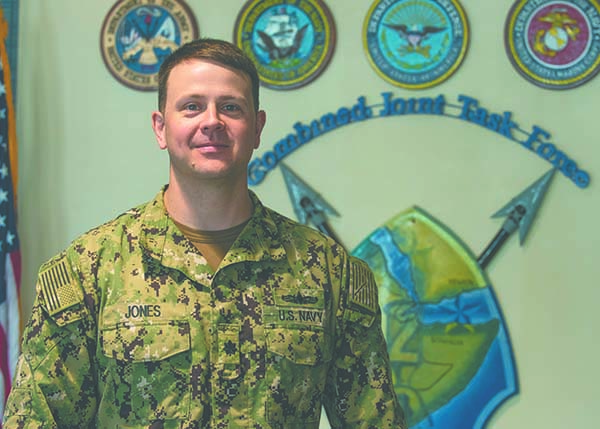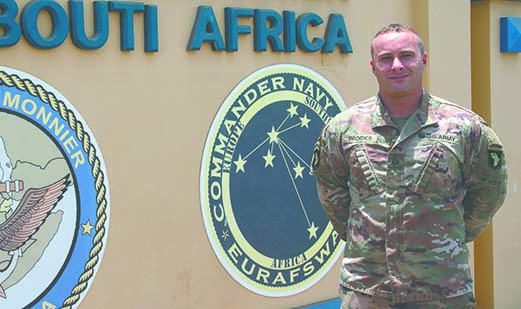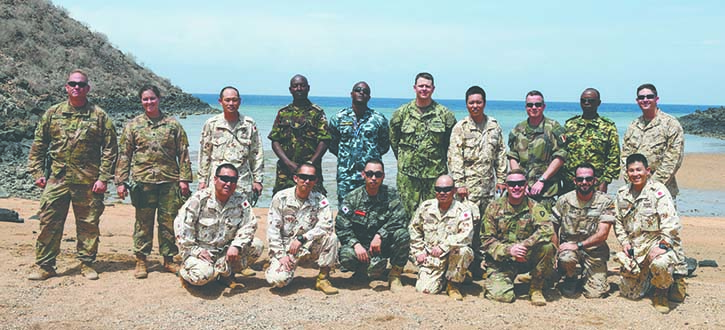


by DON FLETCHER
When Alex Jones and Turner Brooks parted company a year ago after working out together for the last time at Atmore Area YMCA, neither had any idea when their paths might cross again. The local servicemen certainly didn’t expect to bump into each other at a remote, multi-national military outpost more than 8,000 miles from home.
But, as Alex (U.S. Navy CDR Alexander L. Jones) prepared to end a year-long deployment to Camp Lemonnier in Djibouti, Turner (U.S. Army PFC Bradley T. Brooks) arrived in the African country with one of the Army’s most famed units.
Alex, a Naval Reserve officer, serves as deputy director of training, readiness and exercises for the East Africa Response Force, which includes sailors, soldiers and other military personnel from 11 countries. He said he knew exactly where he was headed when he received his orders for Djibouti.
“I have had numerous friends from the Navy, and many of my sailors deployed here,” he said. “When I was notified that I would deploy to (Combined Joint Task Force – Horn of Africa), an officer from my unit was already deployed here. During my time here, I have run across four sailors who served with me when I was CO of units in Pensacola.”
He also learned after arriving in-country that a former Arabian Gulf shipmate on the USS Yorktown, Capitaine de Corvette Thomas Fromage of the French Navy, was stationed at the French naval base in Djibouti.
For Turner, who joined the Army at age 31 and is serving his first overseas tour, there was no such familiarity. In fact, he at first thought someone might be pulling his leg.
“I didn’t know anything about it,” he admitted. “When they said we were deploying to Djibouti, I chuckled and was like, ‘Wait! What? To where? Repeat that name again, sir’!”
When it was explained to him that the country was located in the horn of Africa, he said he recognized the general geographic area to which he was being sent.
“I was more familiar with that term,” Turner said.
Djbouti is located on the Dark Continent’s lower horn. Its coastline is bathed by the waters of the Red Sea and the Gulf of Aden. A deep-water port, Djibouti is a vital location for trade ships that sail the Indian Ocean.
Alex, a member of Atmore First United Methodist Church, is also a member of the United Bank family, where he works as a commercial loan officer. His wife, Leigh Anne is the bank’s chief financial officer, and he is the son of Meg and Bob Jones (who is president and
CEO of the bank).
The Jones family tree is filled with military men and women, including his father’s duty as a Supply Corps Officer.
“My family has served in the military since the Revolutionary War,” said Alex, who added that the ties his family has to Lower Alabama is one of the reasons he returned to Atmore when his active Naval duty ended in 2006. “I’ve had family in southern Alabama since before it was a state. It’s a sense of place.”
Turner, an avid weightlifter whose family attends Cross Point Baptist Church, is the son of Holly Brooks, the father of month-old Nahla Raylyn Turner Brooks and the grandson of Jean and Turner Brooks, for whom he was named and with whom he has had a special relationship
throughout his life.
“He’s my hero,” the soldier said. “He’s the kind of man who would give you the shirt off his back.”
Alex said the mix of nationalities that make up Camp Lemonnier, along with the international trade that is conducted in Djibouti, will be the memory that sticks with him longest.
“The biggest difference (between the USA and the country) is the multi-national component of working in Africa,” he said. “There are French, Japanese, Italian, Spanish and German forces stationed here. It is a crossroads, and as such is a very multi-cultural region. It reminds me of Bogart’s Casablanca.”
Turner, who has yet to become acclimated to the foreign situation, said his curiosity finally got the best of him. That’s why he decided in 2018, at the “advanced” age (for a soldier) of 31, to begin his military service.
“I was very curious,” he said. “The infantry had always been in the back of my mind, and knowing people who have already served and are currently still serving motivated me to endure the challenge.
“I was well aware that not many people joined at 31, especially in the infantry, but I came in hungry for it. When it was all said and done, I never even noticed my age.”
Both servicemen expressed belief in the security mission – and in his role as part of it – in the arid foreign land, on which most of its yearly rain falls during a 26-day period and which has a 90-percent Sunni Muslim population.
“The Foreign Liaison Officers act as a conduit between (the task force’s leadership) and their (respective) countries,” said Alex, who as director of the multi-national coordination cell coordinates the actions of the FLOs from each of the participating countries. “Having them
here helps streamline the communications process between the (U.S.) Department of State, the (U.S.) Department of Defense and their governments.”
Turner, a longtime correctional officer at Baldwin County Jail, expressed similar sentiments.
“My years of working in the prison system taught me one thing: you have to have security,” he said. “If you don’t have security, if your guard is down, the enemy can leverage that weakness.”
Army CPT Olivia Cobiskey, deputy director of public affairs for the Djibouti mission, agreed that the chance of such double-deployments, with one military member almost home-bound and the other just arriving, were rare.
“It’s like two ships passing in the night,” she said.
